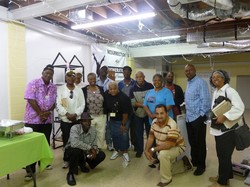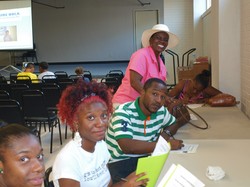Those are the words of a young PC(USA) Self-Development of People (SDOP) staffer, Troy Glover, but it almost certainly echoes the voices of thousands of New Orleans residents who are in many ways still recovering from the ruin left behind by Hurricane Katrina.
SDOP, Presbyterian Disaster Assistance, and the Presbyterian Hunger Program, the three ministries supported by the One Great Hour of Sharing Offering (OGHS), are working together to rebuild New Orleans and Delta wetland communities. The focus will be on working with community groups from areas that have been affected by environmental degradation, poverty, and disaster to help build resiliency and transform the lives of those still impacted by Katrina and other subsequent natural disasters.In addition to dealing with the devastation from natural causes, New Orleans has one of the highest homeless populations in the U.S. and a severe hunger problem that seemingly is not a priority for local government. SDOP is working jointly with neighborhood associations and indigenous groups in the region to prepare for and mitigate future disasters, increase economic prosperity, build self-reliance and food sovereignty, and educate and motivate faithful action among Presbyterians.
One of those faithful servants is Glover. Seven years ago, Troy Glover was a 17-year-old full of anger—and potential. Lacking goals, role models, and a family, he was but a single gunshot away from being consumed into the seedy underbelly of New Orleans, the back streets that lack the notoriety and flair of Bourbon Street. It would have been easy for Glover to drift into the chaos that trouble many city youth who lack outlets, resources, and positive role models, but Troy felt a calling.
“I didn’t know it, but back then God was preparing me for the work I’m doing today,” says Glover. “I did everything with survival in mind—build networks, bargain with my street brothers, and basically learn new ways to survive in the streets. The tactics I learned in the midst of distress helped prepare me for my current position.”

An OGHS grant to VOTE helps ex-offenders earn a sustainable income through skills training. —Troy Glover
Now a Young Adult Community Liaison with SDOP, Glover took the position with little knowledge of the PC(USA) but a faith in God and a will to survive. He had one other big advantage going for him: he knew the city, the people, and the needs of the city.
“At the beginning, working with SDOP was a bit rough, but fun. I was meeting new people, learning more about the extensive problems of the city and playing my part to make significant change. In the past seven years, I’ve helped galvanize dying neighborhoods, funded groups made up of men who were previously incarcerated, supported advocacy issues, and partnered with youth organizations. SDOP and OGHS have enabled me to reach out to mostly disenfranchised, forgotten communities as well as others. It’s very gratifying that SDOP has become one of the more visible and well-liked ministries in the city,” says Glover.
Currently SDOP is active with numerous organizations, including A Community Voice and Voice of the Ex-Offender (VOTE). In the aftermath of Hurricane Katrina 10 years ago, parts of New Orleans still struggle to move forward. East New Orleans residents, for example, are still dealing with inadequately resourced, non-functioning public libraries and limited transportation. In 2012, a $20,000 OGHS grant awarded through SDOP helped fund a community center that offers computer and job skills training, peer mentoring, job search assistance, and internet access. As a result of the resources at this community center, new opportunities have opened up for residents of New Orleans’ seventh, eighth, and ninth wards.
VOTE is a group of well organized ex-offenders, some of whom are living in transition homes, trying to improve their lives and support their families. Last year, SDOP partnered with VOTE by awarding a $15,000 grant that empowers dozens of men and women to earn a sustainable income through employment skills training.
The goal moving forward for Glover and the SDOP ministry is to continue to help alleviate poverty in low-income communities by partnering with poor, oppressed, or disadvantaged community groups. Funding for these types of programs comes directly from OGHS.
“The OGHS initiative is just what this city needs,” says Glover. “By creating a collaborative effort, we’re touching almost all needs of the city. The initiative will address poverty, crime, disaster recovery, hunger, and more. By making this commitment we will impact people now and in the future. We’ll play a role in creating a better New Orleans for all.”
Thank you for giving to the One Great Hour of Sharing Offering. Your generosity makes it possible for the ministries of the Presbyterian Hunger Program, Presbyterian Disaster Assistance, and Self-Development of People to continue.

